Health Studies 11: Perspectives on Mental Health and Illness Essay
VerifiedAdded on 2020/05/11
|15
|4421
|29
Essay
AI Summary
This essay provides a comprehensive overview of mental health, examining various perspectives and models. It begins by defining mental health and illness according to the World Health Organization, highlighting the biological, psychological, and social dimensions involved. The essay then explores the complexities of mental health through the lens of dementia, emphasizing the interplay of biological, societal, and psychological factors. It delves into two primary models: the biomedical model, which focuses on biological factors and treatment, and the social model, which emphasizes societal influences on mental health. The essay further analyzes the impact of stigmatization on mental health, particularly in cases like dementia, and underscores the importance of awareness and education in combating stigma. Finally, it discusses the role of multidisciplinary teams in providing comprehensive mental healthcare, including approaches like behaviourism, psychodynamic theory, and cognitive theory. The essay aims to provide a holistic understanding of mental health, integrating biological, social, and psychological perspectives, and emphasizing the importance of awareness and collaborative care.

Running head: HEALTH STUDIES
Health studies
Name of the Student
Name of the University
Author note
Health studies
Name of the Student
Name of the University
Author note
Paraphrase This Document
Need a fresh take? Get an instant paraphrase of this document with our AI Paraphraser
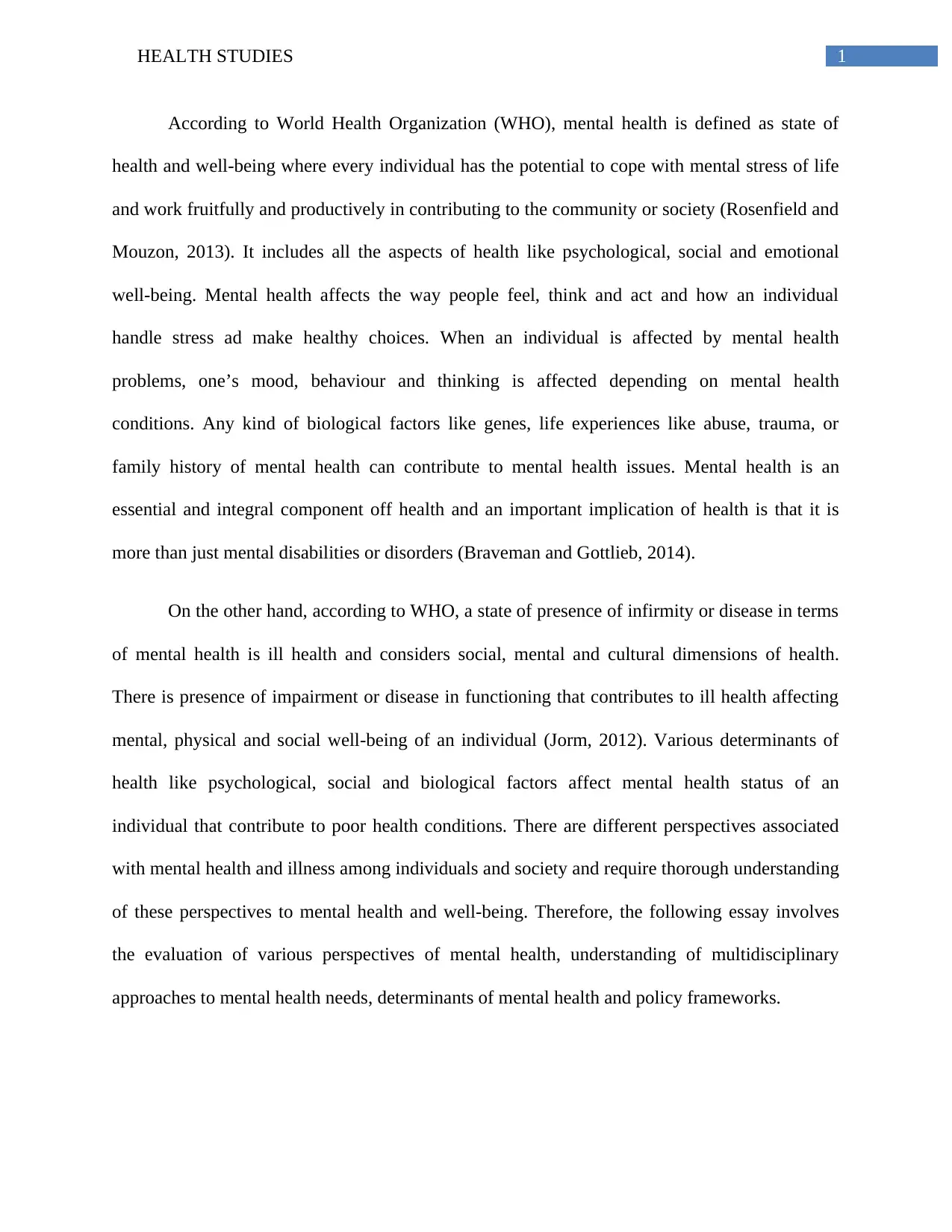
1HEALTH STUDIES
According to World Health Organization (WHO), mental health is defined as state of
health and well-being where every individual has the potential to cope with mental stress of life
and work fruitfully and productively in contributing to the community or society (Rosenfield and
Mouzon, 2013). It includes all the aspects of health like psychological, social and emotional
well-being. Mental health affects the way people feel, think and act and how an individual
handle stress ad make healthy choices. When an individual is affected by mental health
problems, one’s mood, behaviour and thinking is affected depending on mental health
conditions. Any kind of biological factors like genes, life experiences like abuse, trauma, or
family history of mental health can contribute to mental health issues. Mental health is an
essential and integral component off health and an important implication of health is that it is
more than just mental disabilities or disorders (Braveman and Gottlieb, 2014).
On the other hand, according to WHO, a state of presence of infirmity or disease in terms
of mental health is ill health and considers social, mental and cultural dimensions of health.
There is presence of impairment or disease in functioning that contributes to ill health affecting
mental, physical and social well-being of an individual (Jorm, 2012). Various determinants of
health like psychological, social and biological factors affect mental health status of an
individual that contribute to poor health conditions. There are different perspectives associated
with mental health and illness among individuals and society and require thorough understanding
of these perspectives to mental health and well-being. Therefore, the following essay involves
the evaluation of various perspectives of mental health, understanding of multidisciplinary
approaches to mental health needs, determinants of mental health and policy frameworks.
According to World Health Organization (WHO), mental health is defined as state of
health and well-being where every individual has the potential to cope with mental stress of life
and work fruitfully and productively in contributing to the community or society (Rosenfield and
Mouzon, 2013). It includes all the aspects of health like psychological, social and emotional
well-being. Mental health affects the way people feel, think and act and how an individual
handle stress ad make healthy choices. When an individual is affected by mental health
problems, one’s mood, behaviour and thinking is affected depending on mental health
conditions. Any kind of biological factors like genes, life experiences like abuse, trauma, or
family history of mental health can contribute to mental health issues. Mental health is an
essential and integral component off health and an important implication of health is that it is
more than just mental disabilities or disorders (Braveman and Gottlieb, 2014).
On the other hand, according to WHO, a state of presence of infirmity or disease in terms
of mental health is ill health and considers social, mental and cultural dimensions of health.
There is presence of impairment or disease in functioning that contributes to ill health affecting
mental, physical and social well-being of an individual (Jorm, 2012). Various determinants of
health like psychological, social and biological factors affect mental health status of an
individual that contribute to poor health conditions. There are different perspectives associated
with mental health and illness among individuals and society and require thorough understanding
of these perspectives to mental health and well-being. Therefore, the following essay involves
the evaluation of various perspectives of mental health, understanding of multidisciplinary
approaches to mental health needs, determinants of mental health and policy frameworks.
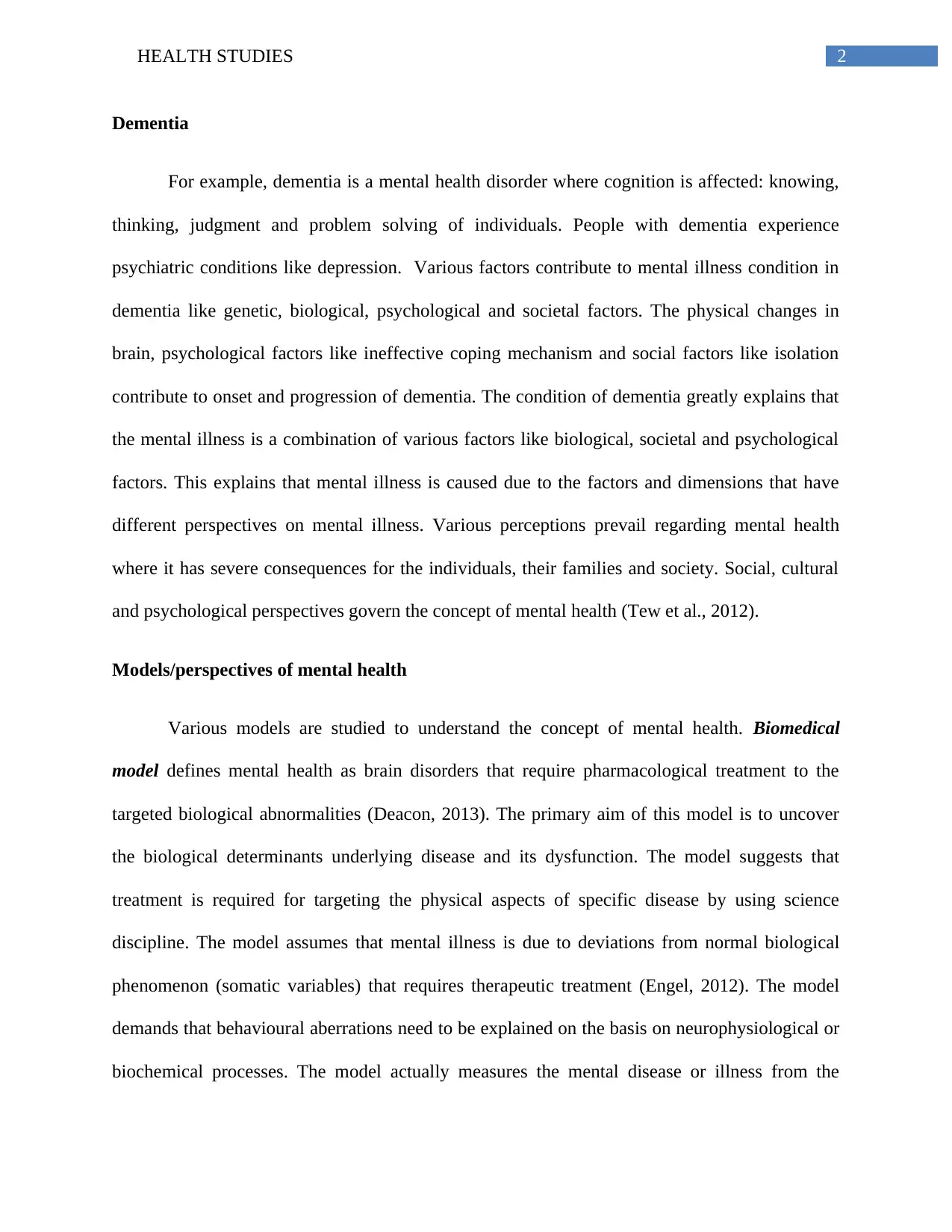
2HEALTH STUDIES
Dementia
For example, dementia is a mental health disorder where cognition is affected: knowing,
thinking, judgment and problem solving of individuals. People with dementia experience
psychiatric conditions like depression. Various factors contribute to mental illness condition in
dementia like genetic, biological, psychological and societal factors. The physical changes in
brain, psychological factors like ineffective coping mechanism and social factors like isolation
contribute to onset and progression of dementia. The condition of dementia greatly explains that
the mental illness is a combination of various factors like biological, societal and psychological
factors. This explains that mental illness is caused due to the factors and dimensions that have
different perspectives on mental illness. Various perceptions prevail regarding mental health
where it has severe consequences for the individuals, their families and society. Social, cultural
and psychological perspectives govern the concept of mental health (Tew et al., 2012).
Models/perspectives of mental health
Various models are studied to understand the concept of mental health. Biomedical
model defines mental health as brain disorders that require pharmacological treatment to the
targeted biological abnormalities (Deacon, 2013). The primary aim of this model is to uncover
the biological determinants underlying disease and its dysfunction. The model suggests that
treatment is required for targeting the physical aspects of specific disease by using science
discipline. The model assumes that mental illness is due to deviations from normal biological
phenomenon (somatic variables) that requires therapeutic treatment (Engel, 2012). The model
demands that behavioural aberrations need to be explained on the basis on neurophysiological or
biochemical processes. The model actually measures the mental disease or illness from the
Dementia
For example, dementia is a mental health disorder where cognition is affected: knowing,
thinking, judgment and problem solving of individuals. People with dementia experience
psychiatric conditions like depression. Various factors contribute to mental illness condition in
dementia like genetic, biological, psychological and societal factors. The physical changes in
brain, psychological factors like ineffective coping mechanism and social factors like isolation
contribute to onset and progression of dementia. The condition of dementia greatly explains that
the mental illness is a combination of various factors like biological, societal and psychological
factors. This explains that mental illness is caused due to the factors and dimensions that have
different perspectives on mental illness. Various perceptions prevail regarding mental health
where it has severe consequences for the individuals, their families and society. Social, cultural
and psychological perspectives govern the concept of mental health (Tew et al., 2012).
Models/perspectives of mental health
Various models are studied to understand the concept of mental health. Biomedical
model defines mental health as brain disorders that require pharmacological treatment to the
targeted biological abnormalities (Deacon, 2013). The primary aim of this model is to uncover
the biological determinants underlying disease and its dysfunction. The model suggests that
treatment is required for targeting the physical aspects of specific disease by using science
discipline. The model assumes that mental illness is due to deviations from normal biological
phenomenon (somatic variables) that requires therapeutic treatment (Engel, 2012). The model
demands that behavioural aberrations need to be explained on the basis on neurophysiological or
biochemical processes. The model actually measures the mental disease or illness from the
⊘ This is a preview!⊘
Do you want full access?
Subscribe today to unlock all pages.

Trusted by 1+ million students worldwide
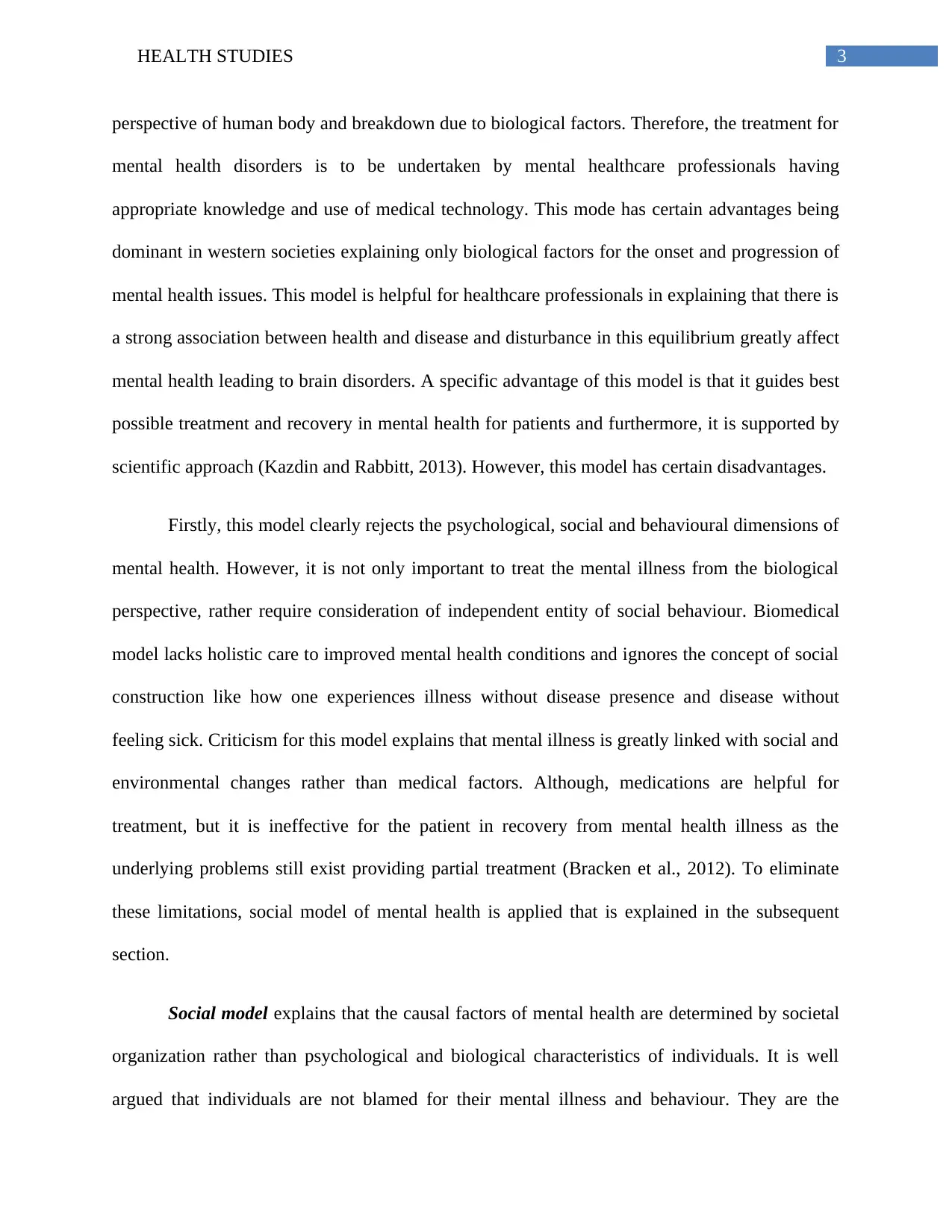
3HEALTH STUDIES
perspective of human body and breakdown due to biological factors. Therefore, the treatment for
mental health disorders is to be undertaken by mental healthcare professionals having
appropriate knowledge and use of medical technology. This mode has certain advantages being
dominant in western societies explaining only biological factors for the onset and progression of
mental health issues. This model is helpful for healthcare professionals in explaining that there is
a strong association between health and disease and disturbance in this equilibrium greatly affect
mental health leading to brain disorders. A specific advantage of this model is that it guides best
possible treatment and recovery in mental health for patients and furthermore, it is supported by
scientific approach (Kazdin and Rabbitt, 2013). However, this model has certain disadvantages.
Firstly, this model clearly rejects the psychological, social and behavioural dimensions of
mental health. However, it is not only important to treat the mental illness from the biological
perspective, rather require consideration of independent entity of social behaviour. Biomedical
model lacks holistic care to improved mental health conditions and ignores the concept of social
construction like how one experiences illness without disease presence and disease without
feeling sick. Criticism for this model explains that mental illness is greatly linked with social and
environmental changes rather than medical factors. Although, medications are helpful for
treatment, but it is ineffective for the patient in recovery from mental health illness as the
underlying problems still exist providing partial treatment (Bracken et al., 2012). To eliminate
these limitations, social model of mental health is applied that is explained in the subsequent
section.
Social model explains that the causal factors of mental health are determined by societal
organization rather than psychological and biological characteristics of individuals. It is well
argued that individuals are not blamed for their mental illness and behaviour. They are the
perspective of human body and breakdown due to biological factors. Therefore, the treatment for
mental health disorders is to be undertaken by mental healthcare professionals having
appropriate knowledge and use of medical technology. This mode has certain advantages being
dominant in western societies explaining only biological factors for the onset and progression of
mental health issues. This model is helpful for healthcare professionals in explaining that there is
a strong association between health and disease and disturbance in this equilibrium greatly affect
mental health leading to brain disorders. A specific advantage of this model is that it guides best
possible treatment and recovery in mental health for patients and furthermore, it is supported by
scientific approach (Kazdin and Rabbitt, 2013). However, this model has certain disadvantages.
Firstly, this model clearly rejects the psychological, social and behavioural dimensions of
mental health. However, it is not only important to treat the mental illness from the biological
perspective, rather require consideration of independent entity of social behaviour. Biomedical
model lacks holistic care to improved mental health conditions and ignores the concept of social
construction like how one experiences illness without disease presence and disease without
feeling sick. Criticism for this model explains that mental illness is greatly linked with social and
environmental changes rather than medical factors. Although, medications are helpful for
treatment, but it is ineffective for the patient in recovery from mental health illness as the
underlying problems still exist providing partial treatment (Bracken et al., 2012). To eliminate
these limitations, social model of mental health is applied that is explained in the subsequent
section.
Social model explains that the causal factors of mental health are determined by societal
organization rather than psychological and biological characteristics of individuals. It is well
argued that individuals are not blamed for their mental illness and behaviour. They are the
Paraphrase This Document
Need a fresh take? Get an instant paraphrase of this document with our AI Paraphraser
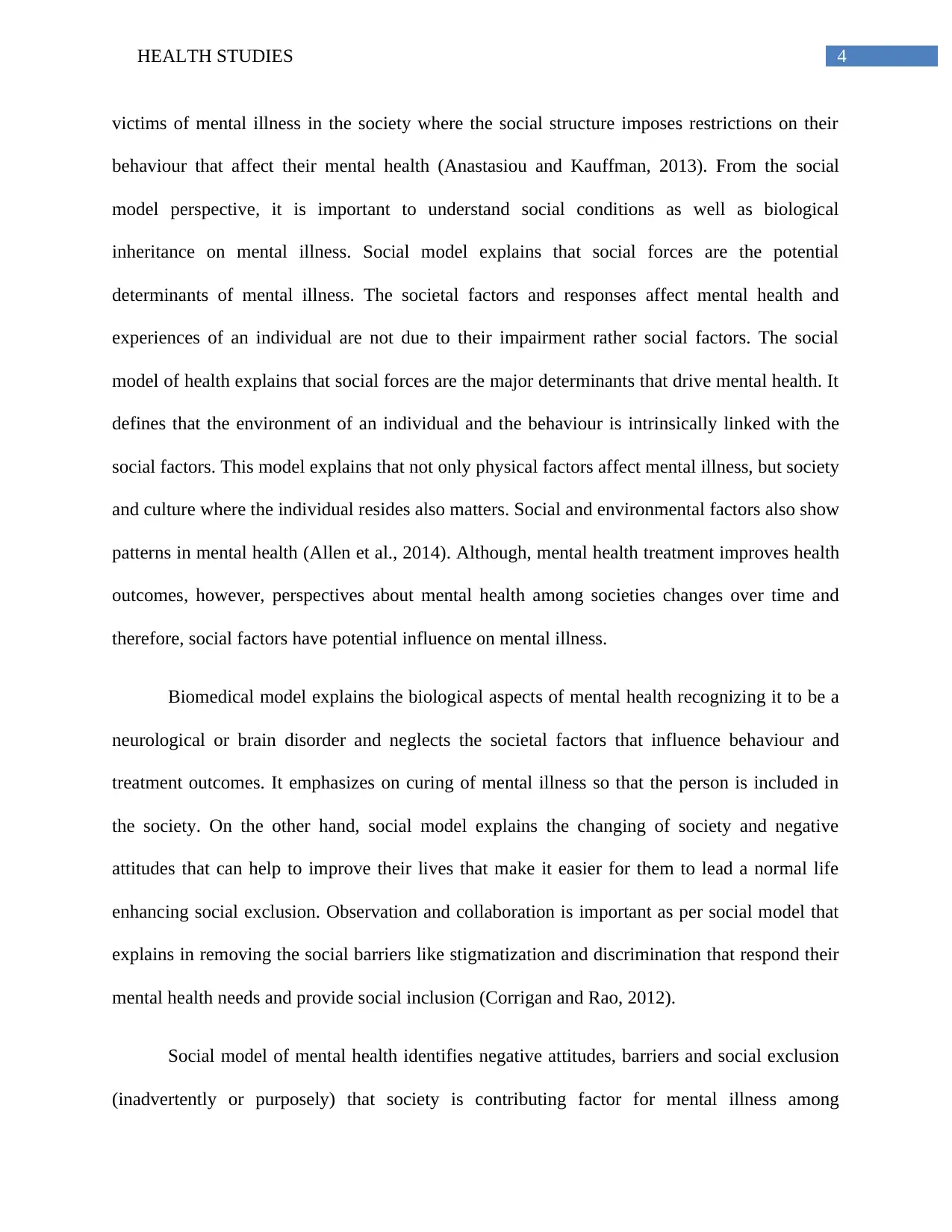
4HEALTH STUDIES
victims of mental illness in the society where the social structure imposes restrictions on their
behaviour that affect their mental health (Anastasiou and Kauffman, 2013). From the social
model perspective, it is important to understand social conditions as well as biological
inheritance on mental illness. Social model explains that social forces are the potential
determinants of mental illness. The societal factors and responses affect mental health and
experiences of an individual are not due to their impairment rather social factors. The social
model of health explains that social forces are the major determinants that drive mental health. It
defines that the environment of an individual and the behaviour is intrinsically linked with the
social factors. This model explains that not only physical factors affect mental illness, but society
and culture where the individual resides also matters. Social and environmental factors also show
patterns in mental health (Allen et al., 2014). Although, mental health treatment improves health
outcomes, however, perspectives about mental health among societies changes over time and
therefore, social factors have potential influence on mental illness.
Biomedical model explains the biological aspects of mental health recognizing it to be a
neurological or brain disorder and neglects the societal factors that influence behaviour and
treatment outcomes. It emphasizes on curing of mental illness so that the person is included in
the society. On the other hand, social model explains the changing of society and negative
attitudes that can help to improve their lives that make it easier for them to lead a normal life
enhancing social exclusion. Observation and collaboration is important as per social model that
explains in removing the social barriers like stigmatization and discrimination that respond their
mental health needs and provide social inclusion (Corrigan and Rao, 2012).
Social model of mental health identifies negative attitudes, barriers and social exclusion
(inadvertently or purposely) that society is contributing factor for mental illness among
victims of mental illness in the society where the social structure imposes restrictions on their
behaviour that affect their mental health (Anastasiou and Kauffman, 2013). From the social
model perspective, it is important to understand social conditions as well as biological
inheritance on mental illness. Social model explains that social forces are the potential
determinants of mental illness. The societal factors and responses affect mental health and
experiences of an individual are not due to their impairment rather social factors. The social
model of health explains that social forces are the major determinants that drive mental health. It
defines that the environment of an individual and the behaviour is intrinsically linked with the
social factors. This model explains that not only physical factors affect mental illness, but society
and culture where the individual resides also matters. Social and environmental factors also show
patterns in mental health (Allen et al., 2014). Although, mental health treatment improves health
outcomes, however, perspectives about mental health among societies changes over time and
therefore, social factors have potential influence on mental illness.
Biomedical model explains the biological aspects of mental health recognizing it to be a
neurological or brain disorder and neglects the societal factors that influence behaviour and
treatment outcomes. It emphasizes on curing of mental illness so that the person is included in
the society. On the other hand, social model explains the changing of society and negative
attitudes that can help to improve their lives that make it easier for them to lead a normal life
enhancing social exclusion. Observation and collaboration is important as per social model that
explains in removing the social barriers like stigmatization and discrimination that respond their
mental health needs and provide social inclusion (Corrigan and Rao, 2012).
Social model of mental health identifies negative attitudes, barriers and social exclusion
(inadvertently or purposely) that society is contributing factor for mental illness among
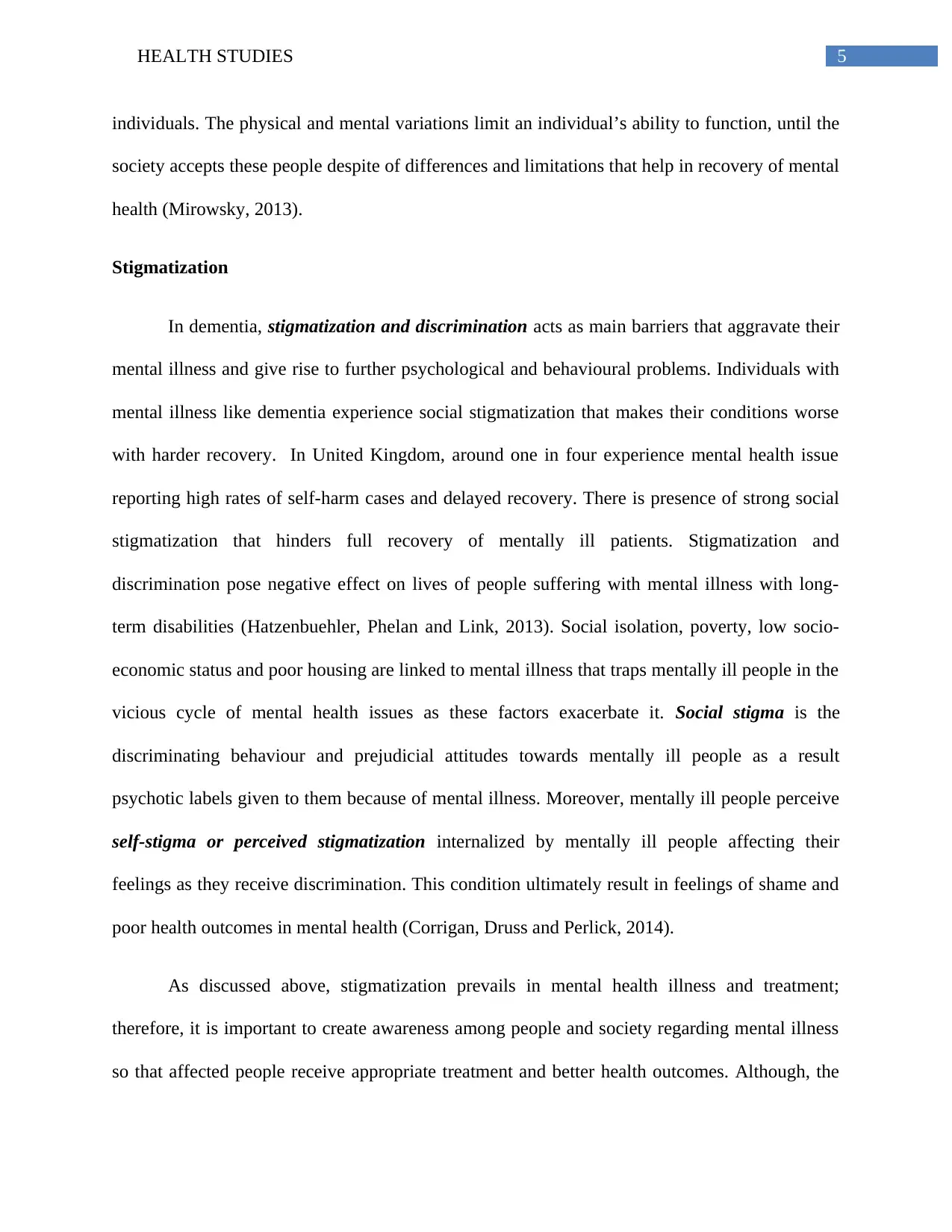
5HEALTH STUDIES
individuals. The physical and mental variations limit an individual’s ability to function, until the
society accepts these people despite of differences and limitations that help in recovery of mental
health (Mirowsky, 2013).
Stigmatization
In dementia, stigmatization and discrimination acts as main barriers that aggravate their
mental illness and give rise to further psychological and behavioural problems. Individuals with
mental illness like dementia experience social stigmatization that makes their conditions worse
with harder recovery. In United Kingdom, around one in four experience mental health issue
reporting high rates of self-harm cases and delayed recovery. There is presence of strong social
stigmatization that hinders full recovery of mentally ill patients. Stigmatization and
discrimination pose negative effect on lives of people suffering with mental illness with long-
term disabilities (Hatzenbuehler, Phelan and Link, 2013). Social isolation, poverty, low socio-
economic status and poor housing are linked to mental illness that traps mentally ill people in the
vicious cycle of mental health issues as these factors exacerbate it. Social stigma is the
discriminating behaviour and prejudicial attitudes towards mentally ill people as a result
psychotic labels given to them because of mental illness. Moreover, mentally ill people perceive
self-stigma or perceived stigmatization internalized by mentally ill people affecting their
feelings as they receive discrimination. This condition ultimately result in feelings of shame and
poor health outcomes in mental health (Corrigan, Druss and Perlick, 2014).
As discussed above, stigmatization prevails in mental health illness and treatment;
therefore, it is important to create awareness among people and society regarding mental illness
so that affected people receive appropriate treatment and better health outcomes. Although, the
individuals. The physical and mental variations limit an individual’s ability to function, until the
society accepts these people despite of differences and limitations that help in recovery of mental
health (Mirowsky, 2013).
Stigmatization
In dementia, stigmatization and discrimination acts as main barriers that aggravate their
mental illness and give rise to further psychological and behavioural problems. Individuals with
mental illness like dementia experience social stigmatization that makes their conditions worse
with harder recovery. In United Kingdom, around one in four experience mental health issue
reporting high rates of self-harm cases and delayed recovery. There is presence of strong social
stigmatization that hinders full recovery of mentally ill patients. Stigmatization and
discrimination pose negative effect on lives of people suffering with mental illness with long-
term disabilities (Hatzenbuehler, Phelan and Link, 2013). Social isolation, poverty, low socio-
economic status and poor housing are linked to mental illness that traps mentally ill people in the
vicious cycle of mental health issues as these factors exacerbate it. Social stigma is the
discriminating behaviour and prejudicial attitudes towards mentally ill people as a result
psychotic labels given to them because of mental illness. Moreover, mentally ill people perceive
self-stigma or perceived stigmatization internalized by mentally ill people affecting their
feelings as they receive discrimination. This condition ultimately result in feelings of shame and
poor health outcomes in mental health (Corrigan, Druss and Perlick, 2014).
As discussed above, stigmatization prevails in mental health illness and treatment;
therefore, it is important to create awareness among people and society regarding mental illness
so that affected people receive appropriate treatment and better health outcomes. Although, the
⊘ This is a preview!⊘
Do you want full access?
Subscribe today to unlock all pages.

Trusted by 1+ million students worldwide
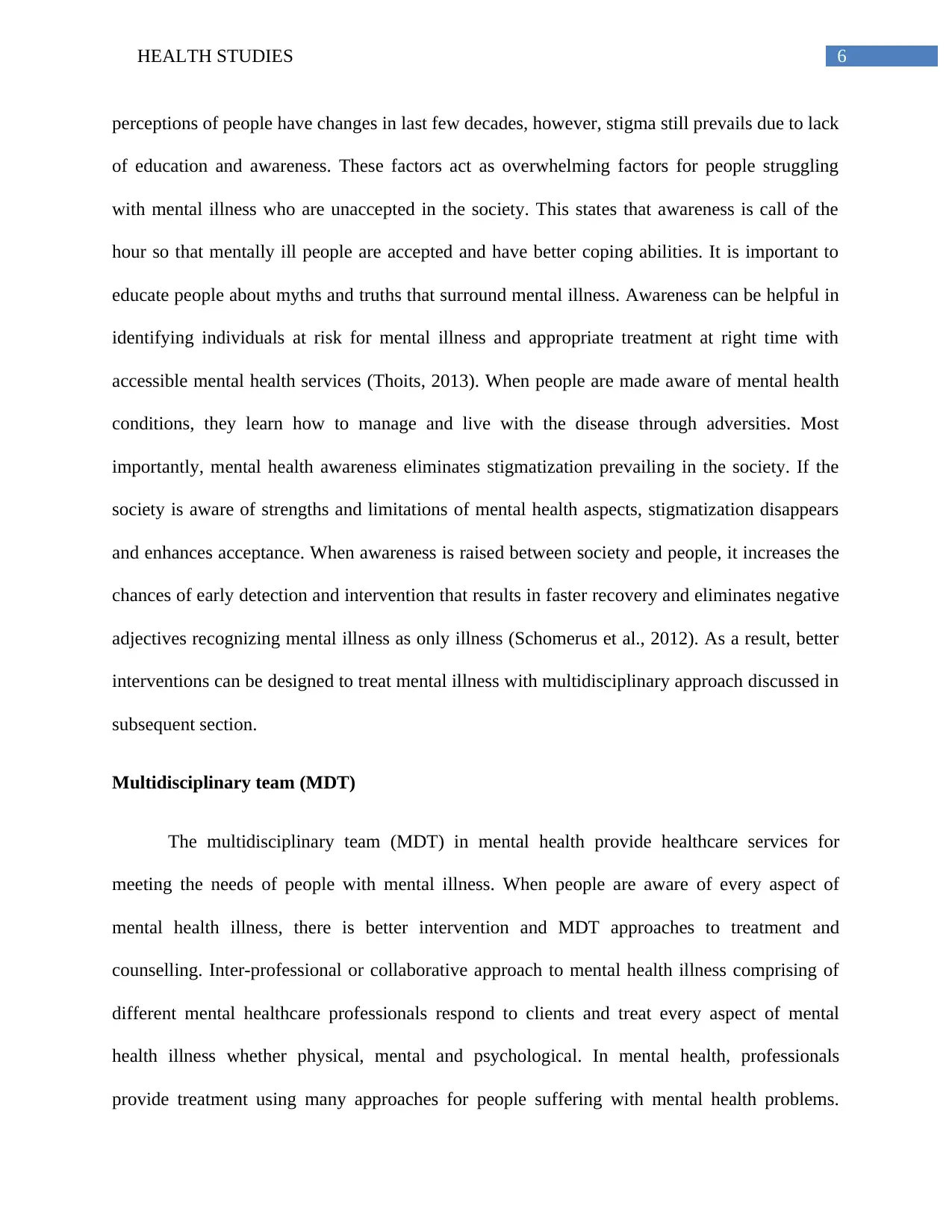
6HEALTH STUDIES
perceptions of people have changes in last few decades, however, stigma still prevails due to lack
of education and awareness. These factors act as overwhelming factors for people struggling
with mental illness who are unaccepted in the society. This states that awareness is call of the
hour so that mentally ill people are accepted and have better coping abilities. It is important to
educate people about myths and truths that surround mental illness. Awareness can be helpful in
identifying individuals at risk for mental illness and appropriate treatment at right time with
accessible mental health services (Thoits, 2013). When people are made aware of mental health
conditions, they learn how to manage and live with the disease through adversities. Most
importantly, mental health awareness eliminates stigmatization prevailing in the society. If the
society is aware of strengths and limitations of mental health aspects, stigmatization disappears
and enhances acceptance. When awareness is raised between society and people, it increases the
chances of early detection and intervention that results in faster recovery and eliminates negative
adjectives recognizing mental illness as only illness (Schomerus et al., 2012). As a result, better
interventions can be designed to treat mental illness with multidisciplinary approach discussed in
subsequent section.
Multidisciplinary team (MDT)
The multidisciplinary team (MDT) in mental health provide healthcare services for
meeting the needs of people with mental illness. When people are aware of every aspect of
mental health illness, there is better intervention and MDT approaches to treatment and
counselling. Inter-professional or collaborative approach to mental health illness comprising of
different mental healthcare professionals respond to clients and treat every aspect of mental
health illness whether physical, mental and psychological. In mental health, professionals
provide treatment using many approaches for people suffering with mental health problems.
perceptions of people have changes in last few decades, however, stigma still prevails due to lack
of education and awareness. These factors act as overwhelming factors for people struggling
with mental illness who are unaccepted in the society. This states that awareness is call of the
hour so that mentally ill people are accepted and have better coping abilities. It is important to
educate people about myths and truths that surround mental illness. Awareness can be helpful in
identifying individuals at risk for mental illness and appropriate treatment at right time with
accessible mental health services (Thoits, 2013). When people are made aware of mental health
conditions, they learn how to manage and live with the disease through adversities. Most
importantly, mental health awareness eliminates stigmatization prevailing in the society. If the
society is aware of strengths and limitations of mental health aspects, stigmatization disappears
and enhances acceptance. When awareness is raised between society and people, it increases the
chances of early detection and intervention that results in faster recovery and eliminates negative
adjectives recognizing mental illness as only illness (Schomerus et al., 2012). As a result, better
interventions can be designed to treat mental illness with multidisciplinary approach discussed in
subsequent section.
Multidisciplinary team (MDT)
The multidisciplinary team (MDT) in mental health provide healthcare services for
meeting the needs of people with mental illness. When people are aware of every aspect of
mental health illness, there is better intervention and MDT approaches to treatment and
counselling. Inter-professional or collaborative approach to mental health illness comprising of
different mental healthcare professionals respond to clients and treat every aspect of mental
health illness whether physical, mental and psychological. In mental health, professionals
provide treatment using many approaches for people suffering with mental health problems.
Paraphrase This Document
Need a fresh take? Get an instant paraphrase of this document with our AI Paraphraser
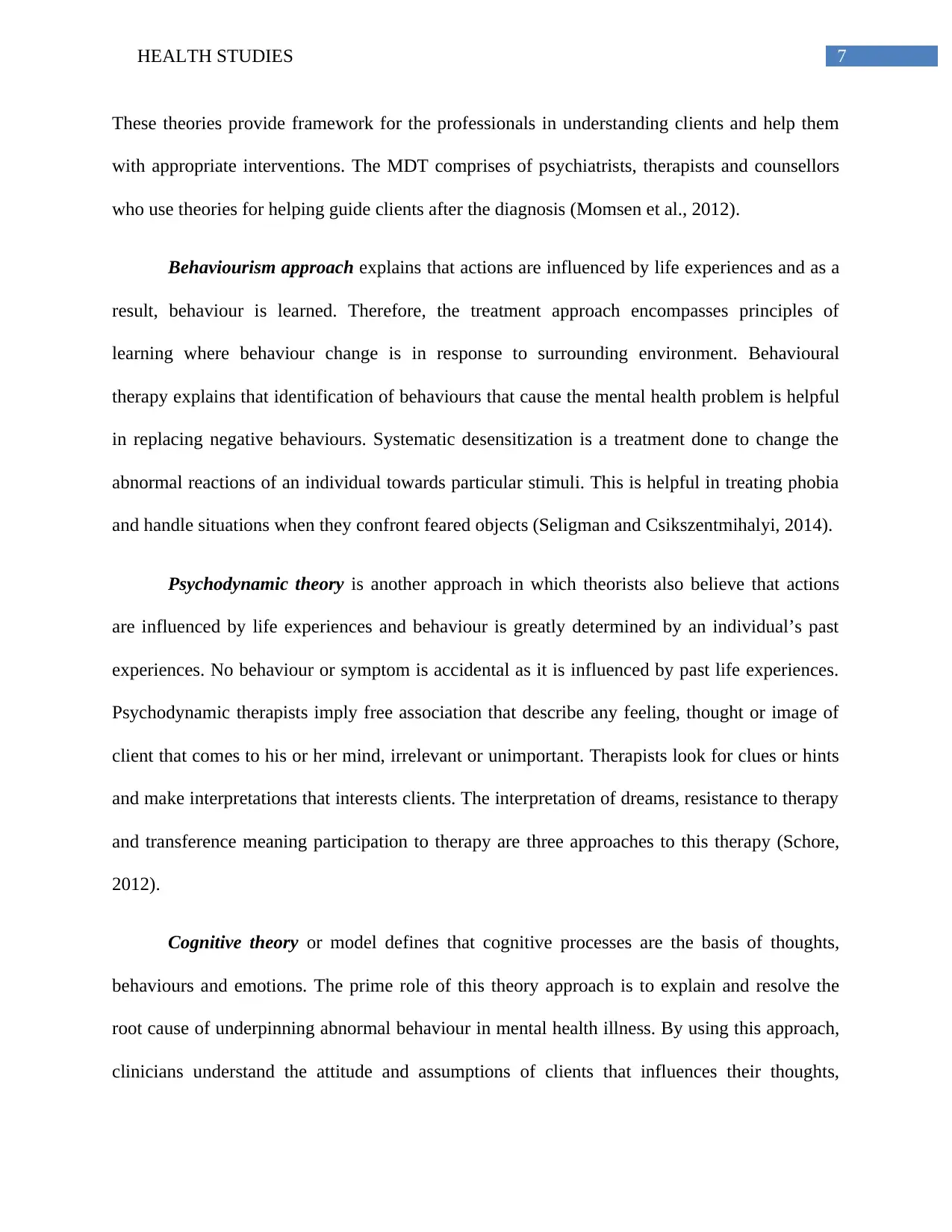
7HEALTH STUDIES
These theories provide framework for the professionals in understanding clients and help them
with appropriate interventions. The MDT comprises of psychiatrists, therapists and counsellors
who use theories for helping guide clients after the diagnosis (Momsen et al., 2012).
Behaviourism approach explains that actions are influenced by life experiences and as a
result, behaviour is learned. Therefore, the treatment approach encompasses principles of
learning where behaviour change is in response to surrounding environment. Behavioural
therapy explains that identification of behaviours that cause the mental health problem is helpful
in replacing negative behaviours. Systematic desensitization is a treatment done to change the
abnormal reactions of an individual towards particular stimuli. This is helpful in treating phobia
and handle situations when they confront feared objects (Seligman and Csikszentmihalyi, 2014).
Psychodynamic theory is another approach in which theorists also believe that actions
are influenced by life experiences and behaviour is greatly determined by an individual’s past
experiences. No behaviour or symptom is accidental as it is influenced by past life experiences.
Psychodynamic therapists imply free association that describe any feeling, thought or image of
client that comes to his or her mind, irrelevant or unimportant. Therapists look for clues or hints
and make interpretations that interests clients. The interpretation of dreams, resistance to therapy
and transference meaning participation to therapy are three approaches to this therapy (Schore,
2012).
Cognitive theory or model defines that cognitive processes are the basis of thoughts,
behaviours and emotions. The prime role of this theory approach is to explain and resolve the
root cause of underpinning abnormal behaviour in mental health illness. By using this approach,
clinicians understand the attitude and assumptions of clients that influences their thoughts,
These theories provide framework for the professionals in understanding clients and help them
with appropriate interventions. The MDT comprises of psychiatrists, therapists and counsellors
who use theories for helping guide clients after the diagnosis (Momsen et al., 2012).
Behaviourism approach explains that actions are influenced by life experiences and as a
result, behaviour is learned. Therefore, the treatment approach encompasses principles of
learning where behaviour change is in response to surrounding environment. Behavioural
therapy explains that identification of behaviours that cause the mental health problem is helpful
in replacing negative behaviours. Systematic desensitization is a treatment done to change the
abnormal reactions of an individual towards particular stimuli. This is helpful in treating phobia
and handle situations when they confront feared objects (Seligman and Csikszentmihalyi, 2014).
Psychodynamic theory is another approach in which theorists also believe that actions
are influenced by life experiences and behaviour is greatly determined by an individual’s past
experiences. No behaviour or symptom is accidental as it is influenced by past life experiences.
Psychodynamic therapists imply free association that describe any feeling, thought or image of
client that comes to his or her mind, irrelevant or unimportant. Therapists look for clues or hints
and make interpretations that interests clients. The interpretation of dreams, resistance to therapy
and transference meaning participation to therapy are three approaches to this therapy (Schore,
2012).
Cognitive theory or model defines that cognitive processes are the basis of thoughts,
behaviours and emotions. The prime role of this theory approach is to explain and resolve the
root cause of underpinning abnormal behaviour in mental health illness. By using this approach,
clinicians understand the attitude and assumptions of clients that influences their thoughts,
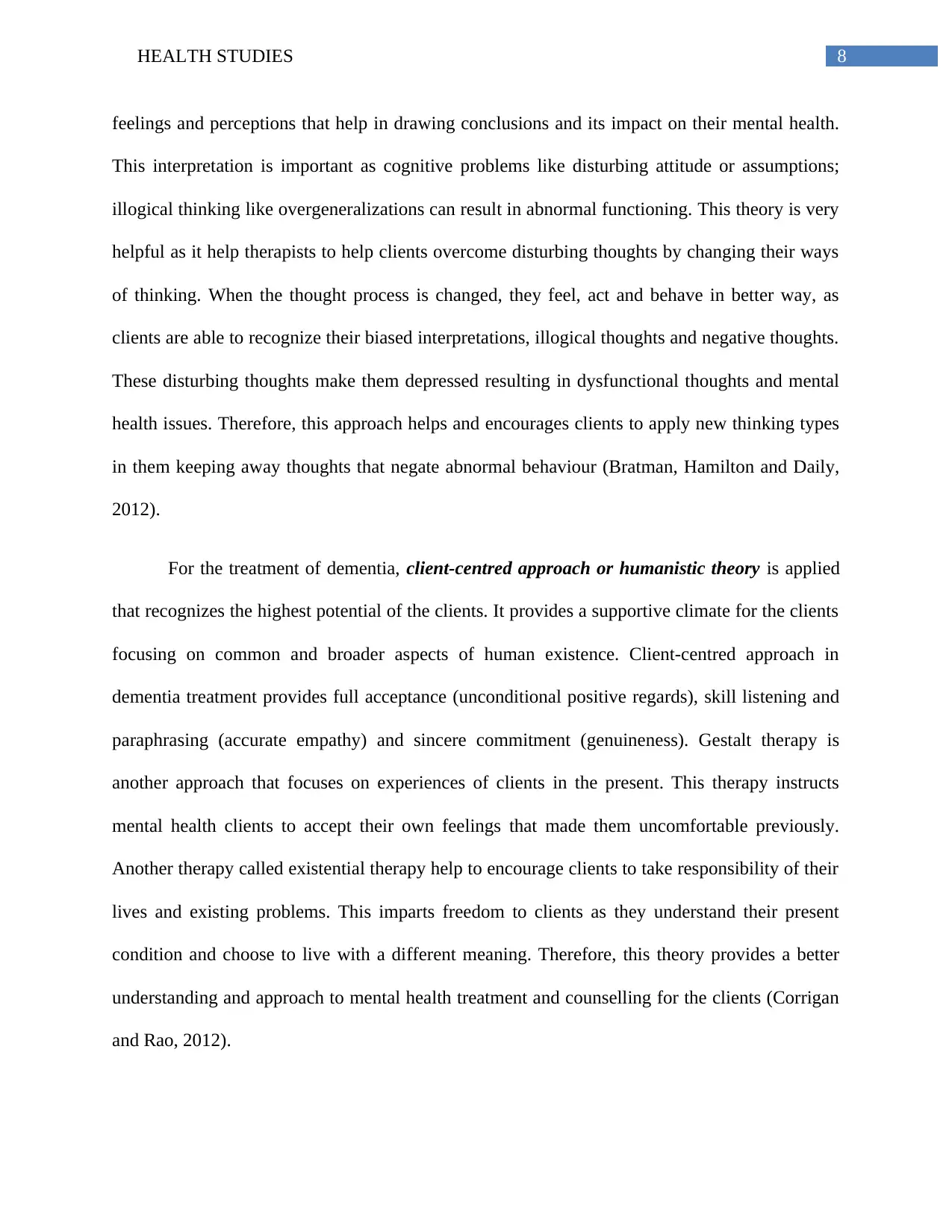
8HEALTH STUDIES
feelings and perceptions that help in drawing conclusions and its impact on their mental health.
This interpretation is important as cognitive problems like disturbing attitude or assumptions;
illogical thinking like overgeneralizations can result in abnormal functioning. This theory is very
helpful as it help therapists to help clients overcome disturbing thoughts by changing their ways
of thinking. When the thought process is changed, they feel, act and behave in better way, as
clients are able to recognize their biased interpretations, illogical thoughts and negative thoughts.
These disturbing thoughts make them depressed resulting in dysfunctional thoughts and mental
health issues. Therefore, this approach helps and encourages clients to apply new thinking types
in them keeping away thoughts that negate abnormal behaviour (Bratman, Hamilton and Daily,
2012).
For the treatment of dementia, client-centred approach or humanistic theory is applied
that recognizes the highest potential of the clients. It provides a supportive climate for the clients
focusing on common and broader aspects of human existence. Client-centred approach in
dementia treatment provides full acceptance (unconditional positive regards), skill listening and
paraphrasing (accurate empathy) and sincere commitment (genuineness). Gestalt therapy is
another approach that focuses on experiences of clients in the present. This therapy instructs
mental health clients to accept their own feelings that made them uncomfortable previously.
Another therapy called existential therapy help to encourage clients to take responsibility of their
lives and existing problems. This imparts freedom to clients as they understand their present
condition and choose to live with a different meaning. Therefore, this theory provides a better
understanding and approach to mental health treatment and counselling for the clients (Corrigan
and Rao, 2012).
feelings and perceptions that help in drawing conclusions and its impact on their mental health.
This interpretation is important as cognitive problems like disturbing attitude or assumptions;
illogical thinking like overgeneralizations can result in abnormal functioning. This theory is very
helpful as it help therapists to help clients overcome disturbing thoughts by changing their ways
of thinking. When the thought process is changed, they feel, act and behave in better way, as
clients are able to recognize their biased interpretations, illogical thoughts and negative thoughts.
These disturbing thoughts make them depressed resulting in dysfunctional thoughts and mental
health issues. Therefore, this approach helps and encourages clients to apply new thinking types
in them keeping away thoughts that negate abnormal behaviour (Bratman, Hamilton and Daily,
2012).
For the treatment of dementia, client-centred approach or humanistic theory is applied
that recognizes the highest potential of the clients. It provides a supportive climate for the clients
focusing on common and broader aspects of human existence. Client-centred approach in
dementia treatment provides full acceptance (unconditional positive regards), skill listening and
paraphrasing (accurate empathy) and sincere commitment (genuineness). Gestalt therapy is
another approach that focuses on experiences of clients in the present. This therapy instructs
mental health clients to accept their own feelings that made them uncomfortable previously.
Another therapy called existential therapy help to encourage clients to take responsibility of their
lives and existing problems. This imparts freedom to clients as they understand their present
condition and choose to live with a different meaning. Therefore, this theory provides a better
understanding and approach to mental health treatment and counselling for the clients (Corrigan
and Rao, 2012).
⊘ This is a preview!⊘
Do you want full access?
Subscribe today to unlock all pages.

Trusted by 1+ million students worldwide
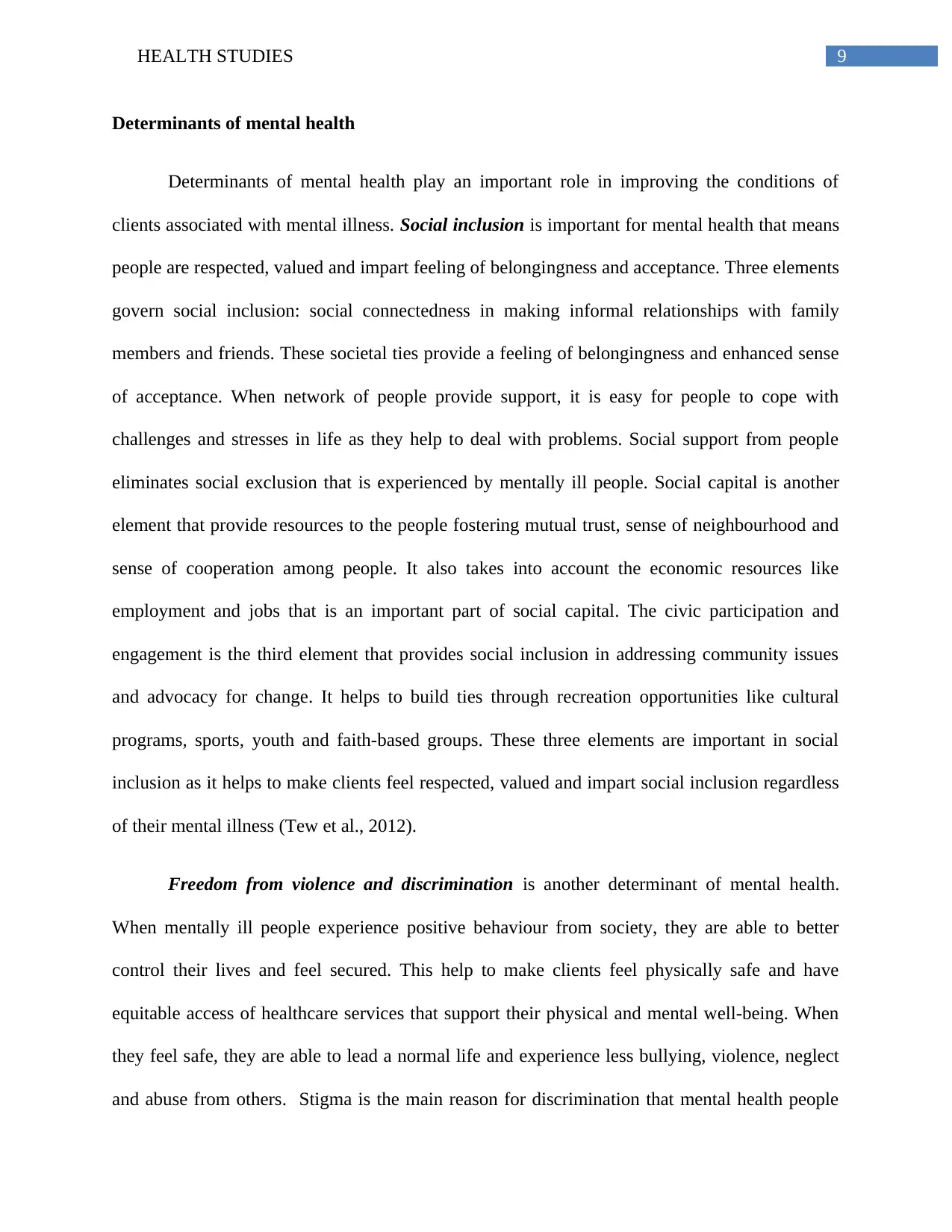
9HEALTH STUDIES
Determinants of mental health
Determinants of mental health play an important role in improving the conditions of
clients associated with mental illness. Social inclusion is important for mental health that means
people are respected, valued and impart feeling of belongingness and acceptance. Three elements
govern social inclusion: social connectedness in making informal relationships with family
members and friends. These societal ties provide a feeling of belongingness and enhanced sense
of acceptance. When network of people provide support, it is easy for people to cope with
challenges and stresses in life as they help to deal with problems. Social support from people
eliminates social exclusion that is experienced by mentally ill people. Social capital is another
element that provide resources to the people fostering mutual trust, sense of neighbourhood and
sense of cooperation among people. It also takes into account the economic resources like
employment and jobs that is an important part of social capital. The civic participation and
engagement is the third element that provides social inclusion in addressing community issues
and advocacy for change. It helps to build ties through recreation opportunities like cultural
programs, sports, youth and faith-based groups. These three elements are important in social
inclusion as it helps to make clients feel respected, valued and impart social inclusion regardless
of their mental illness (Tew et al., 2012).
Freedom from violence and discrimination is another determinant of mental health.
When mentally ill people experience positive behaviour from society, they are able to better
control their lives and feel secured. This help to make clients feel physically safe and have
equitable access of healthcare services that support their physical and mental well-being. When
they feel safe, they are able to lead a normal life and experience less bullying, violence, neglect
and abuse from others. Stigma is the main reason for discrimination that mental health people
Determinants of mental health
Determinants of mental health play an important role in improving the conditions of
clients associated with mental illness. Social inclusion is important for mental health that means
people are respected, valued and impart feeling of belongingness and acceptance. Three elements
govern social inclusion: social connectedness in making informal relationships with family
members and friends. These societal ties provide a feeling of belongingness and enhanced sense
of acceptance. When network of people provide support, it is easy for people to cope with
challenges and stresses in life as they help to deal with problems. Social support from people
eliminates social exclusion that is experienced by mentally ill people. Social capital is another
element that provide resources to the people fostering mutual trust, sense of neighbourhood and
sense of cooperation among people. It also takes into account the economic resources like
employment and jobs that is an important part of social capital. The civic participation and
engagement is the third element that provides social inclusion in addressing community issues
and advocacy for change. It helps to build ties through recreation opportunities like cultural
programs, sports, youth and faith-based groups. These three elements are important in social
inclusion as it helps to make clients feel respected, valued and impart social inclusion regardless
of their mental illness (Tew et al., 2012).
Freedom from violence and discrimination is another determinant of mental health.
When mentally ill people experience positive behaviour from society, they are able to better
control their lives and feel secured. This help to make clients feel physically safe and have
equitable access of healthcare services that support their physical and mental well-being. When
they feel safe, they are able to lead a normal life and experience less bullying, violence, neglect
and abuse from others. Stigma is the main reason for discrimination that mental health people
Paraphrase This Document
Need a fresh take? Get an instant paraphrase of this document with our AI Paraphraser
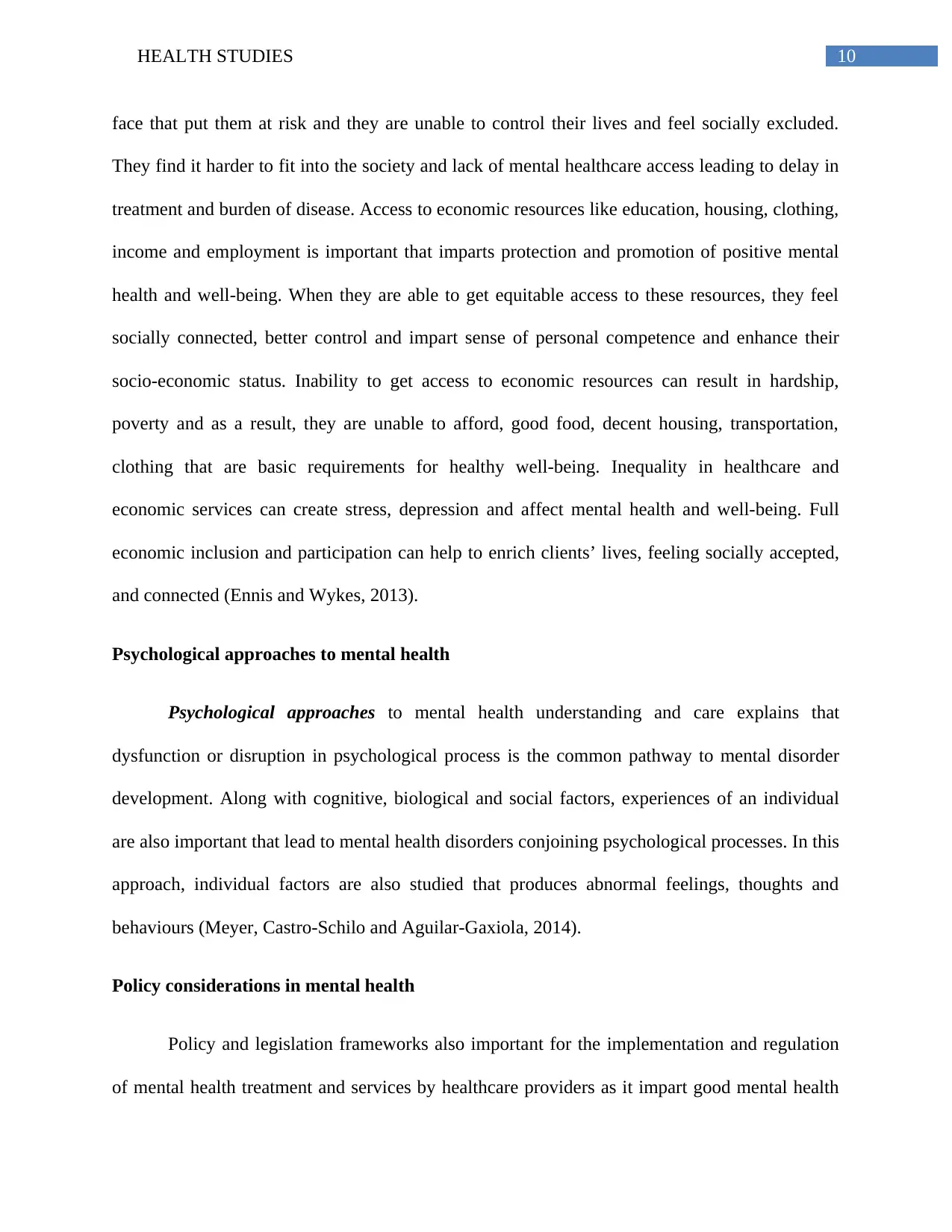
10HEALTH STUDIES
face that put them at risk and they are unable to control their lives and feel socially excluded.
They find it harder to fit into the society and lack of mental healthcare access leading to delay in
treatment and burden of disease. Access to economic resources like education, housing, clothing,
income and employment is important that imparts protection and promotion of positive mental
health and well-being. When they are able to get equitable access to these resources, they feel
socially connected, better control and impart sense of personal competence and enhance their
socio-economic status. Inability to get access to economic resources can result in hardship,
poverty and as a result, they are unable to afford, good food, decent housing, transportation,
clothing that are basic requirements for healthy well-being. Inequality in healthcare and
economic services can create stress, depression and affect mental health and well-being. Full
economic inclusion and participation can help to enrich clients’ lives, feeling socially accepted,
and connected (Ennis and Wykes, 2013).
Psychological approaches to mental health
Psychological approaches to mental health understanding and care explains that
dysfunction or disruption in psychological process is the common pathway to mental disorder
development. Along with cognitive, biological and social factors, experiences of an individual
are also important that lead to mental health disorders conjoining psychological processes. In this
approach, individual factors are also studied that produces abnormal feelings, thoughts and
behaviours (Meyer, Castro-Schilo and Aguilar-Gaxiola, 2014).
Policy considerations in mental health
Policy and legislation frameworks also important for the implementation and regulation
of mental health treatment and services by healthcare providers as it impart good mental health
face that put them at risk and they are unable to control their lives and feel socially excluded.
They find it harder to fit into the society and lack of mental healthcare access leading to delay in
treatment and burden of disease. Access to economic resources like education, housing, clothing,
income and employment is important that imparts protection and promotion of positive mental
health and well-being. When they are able to get equitable access to these resources, they feel
socially connected, better control and impart sense of personal competence and enhance their
socio-economic status. Inability to get access to economic resources can result in hardship,
poverty and as a result, they are unable to afford, good food, decent housing, transportation,
clothing that are basic requirements for healthy well-being. Inequality in healthcare and
economic services can create stress, depression and affect mental health and well-being. Full
economic inclusion and participation can help to enrich clients’ lives, feeling socially accepted,
and connected (Ennis and Wykes, 2013).
Psychological approaches to mental health
Psychological approaches to mental health understanding and care explains that
dysfunction or disruption in psychological process is the common pathway to mental disorder
development. Along with cognitive, biological and social factors, experiences of an individual
are also important that lead to mental health disorders conjoining psychological processes. In this
approach, individual factors are also studied that produces abnormal feelings, thoughts and
behaviours (Meyer, Castro-Schilo and Aguilar-Gaxiola, 2014).
Policy considerations in mental health
Policy and legislation frameworks also important for the implementation and regulation
of mental health treatment and services by healthcare providers as it impart good mental health
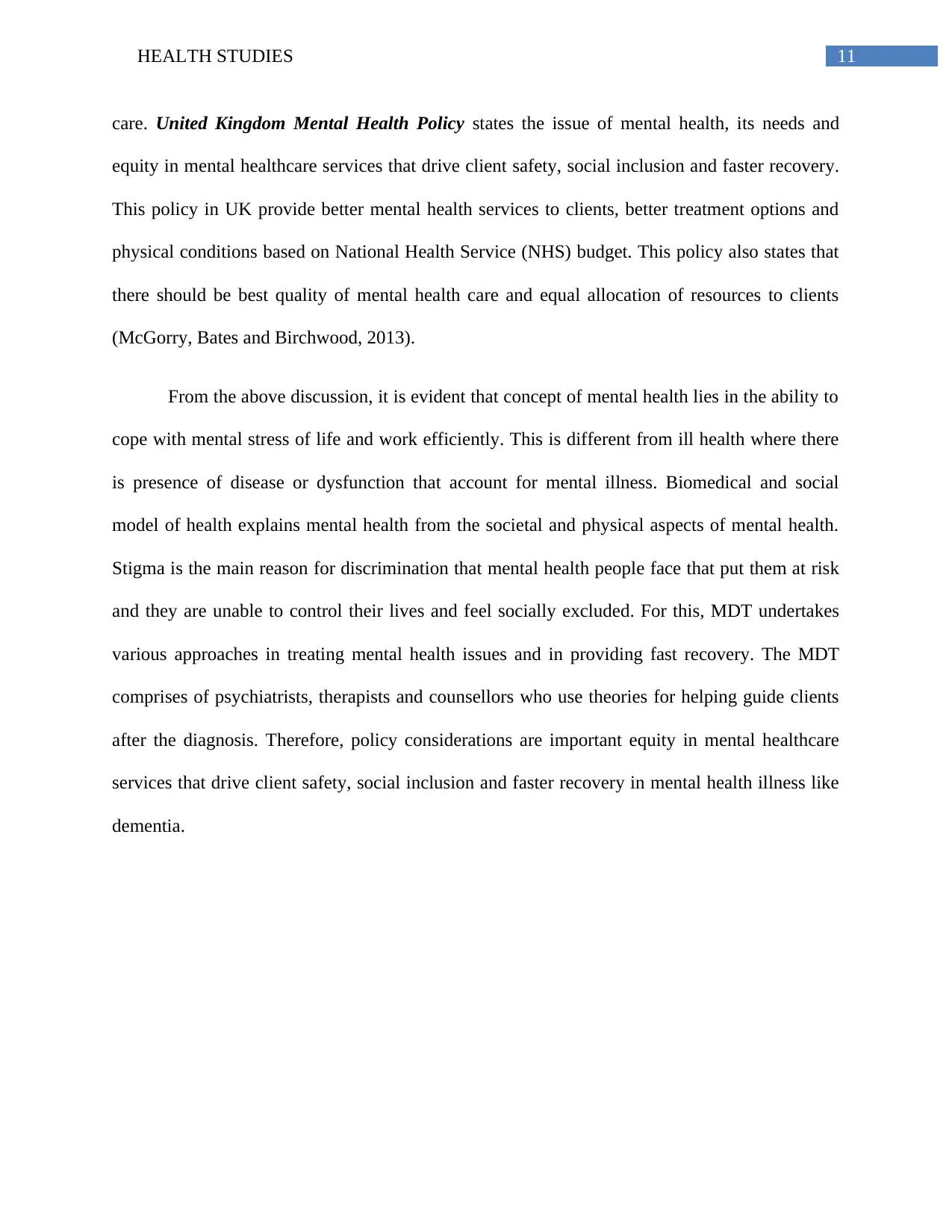
11HEALTH STUDIES
care. United Kingdom Mental Health Policy states the issue of mental health, its needs and
equity in mental healthcare services that drive client safety, social inclusion and faster recovery.
This policy in UK provide better mental health services to clients, better treatment options and
physical conditions based on National Health Service (NHS) budget. This policy also states that
there should be best quality of mental health care and equal allocation of resources to clients
(McGorry, Bates and Birchwood, 2013).
From the above discussion, it is evident that concept of mental health lies in the ability to
cope with mental stress of life and work efficiently. This is different from ill health where there
is presence of disease or dysfunction that account for mental illness. Biomedical and social
model of health explains mental health from the societal and physical aspects of mental health.
Stigma is the main reason for discrimination that mental health people face that put them at risk
and they are unable to control their lives and feel socially excluded. For this, MDT undertakes
various approaches in treating mental health issues and in providing fast recovery. The MDT
comprises of psychiatrists, therapists and counsellors who use theories for helping guide clients
after the diagnosis. Therefore, policy considerations are important equity in mental healthcare
services that drive client safety, social inclusion and faster recovery in mental health illness like
dementia.
care. United Kingdom Mental Health Policy states the issue of mental health, its needs and
equity in mental healthcare services that drive client safety, social inclusion and faster recovery.
This policy in UK provide better mental health services to clients, better treatment options and
physical conditions based on National Health Service (NHS) budget. This policy also states that
there should be best quality of mental health care and equal allocation of resources to clients
(McGorry, Bates and Birchwood, 2013).
From the above discussion, it is evident that concept of mental health lies in the ability to
cope with mental stress of life and work efficiently. This is different from ill health where there
is presence of disease or dysfunction that account for mental illness. Biomedical and social
model of health explains mental health from the societal and physical aspects of mental health.
Stigma is the main reason for discrimination that mental health people face that put them at risk
and they are unable to control their lives and feel socially excluded. For this, MDT undertakes
various approaches in treating mental health issues and in providing fast recovery. The MDT
comprises of psychiatrists, therapists and counsellors who use theories for helping guide clients
after the diagnosis. Therefore, policy considerations are important equity in mental healthcare
services that drive client safety, social inclusion and faster recovery in mental health illness like
dementia.
⊘ This is a preview!⊘
Do you want full access?
Subscribe today to unlock all pages.

Trusted by 1+ million students worldwide
1 out of 15
Related Documents
Your All-in-One AI-Powered Toolkit for Academic Success.
+13062052269
info@desklib.com
Available 24*7 on WhatsApp / Email
![[object Object]](/_next/static/media/star-bottom.7253800d.svg)
Unlock your academic potential
Copyright © 2020–2026 A2Z Services. All Rights Reserved. Developed and managed by ZUCOL.





